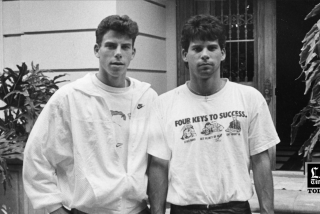Seven former Angels could be summoned as witnesses in Eric Kay trial

- Share via
Federal prosecutors could call seven former Angels players as witnesses during the trial of the ex-communications director Eric Kay in the fatal overdose of pitcher Tyler Skaggs.
In a witness list filed Thursday in U.S. District Court in Fort Worth, Texas, prosecutors listed ex-Angels Cam Bedrosian, C.J. Cron, Matt Harvey, Andrew Heaney, Mike Morin, Blake Parker and Garrett Richards among 77 potential witnesses.
The document provides a brief overview about the testimony of each witness, though such lists usually include many witnesses who never take the stand. The entry for Harvey, who pitched 12 games for the Angels in 2019 before being released, is typical: “Interactions with [Skaggs] and interactions with Eric Kay. Will testify that Eric Kay provided drugs believed to be oxycodone to [Skaggs] and others; knowledge of [Skaggs] oxycodone use; lingo used when referring to oxycodone pills; and communications with Eric Kay about oxycodone.”
The entry for Richards said: “Will testify that Eric Kay asked him for unused oxycodone pills.”
Among scores of possible exhibits listed by prosecutors are immunity letters for three people identified only by the initials — C.C., M.M. and B.P. — in addition to grand jury and trial immunity orders for a fourth person identified as M.H.
Several current and former Angels front-office employees are on the list, too. They include former vice president of communications Tim Mead, traveling secretary Tom Taylor and communications director Adam Chodzko.
“Eric Kay’s demeanor and performance of work duties before and after the death of [Skaggs]; Eric Kay’s statements about attending rehab for opioid addiction,” the entry describing Chodzko’s testimony read, continuing, “layout of Angels Stadium and pre- and post-game procedures for communications department; travel duties for communications department; actions taken on July 1, 2019 after learning of the death of [Skaggs]; statements made and actions taken by Eric Kay after the death of [Skaggs].”
After several delays, Kay’s trial is scheduled to start next week. He has pleaded not guilty to charges of distributing the drug that led to Skaggs’ death and conspiring to “possess with the intent to distribute” the opioids fentanyl and oxycodone “beginning in or before 2017.”
Skaggs was found dead in his Southlake, Texas, hotel room on July 1, 2019, before the Angels opened a series against the Texas Rangers.
The Times’ motion was filed in the criminal case against former Angels communications director Eric Kay, who is accused of providing the fentanyl that allegedly led to the pitcher’s fatal overdose.
Law enforcement discovered a counterfeit 30-milligram oxycodone tablet containing fentanyl — a synthetic opioid 80 to 100 times more powerful than morphine — in the room. Two months later, the Tarrant County medical examiner ruled that the 27-year-old died from “mixed ethanol, fentanyl and oxycodone intoxication” that led to choking on his vomit.
Prosecutors allege Kay had been “distributing controlled substances, including oxycodone” to players since “at least” 2017.
“The government anticipates presenting testimony of approximately five players who received oxycodone from Kay in 2017, 2018, and/or 2019,” prosecutors said in a motion filed in August. “The evidence will also demonstrate that Kay often coordinated the distribution through text messages or through conversations involving the victim, [Skaggs].”
Prosecutors initially filed the witness and exhibit lists under seal before a previous trial date last fall and fought to keep them sealed until the conclusion of testimony. The Los Angeles Times moved to intervene in the case in December in an effort to unseal the lists.
In response, last month Judge Terry R. Means ordered that the witness and exhibit lists for the upcoming trial not be sealed “absent extremely good cause.” But prosecutors again asked to seal the lists until the trial ended, citing “significant media attention” and alleged that publication of the lists “could enable third parties, directly or indirectly, to intimidate or embarrass the witnesses in such a manner that would alter their anticipated testimony.” Prosecutors subsequently asked the judge to extend the deadline to file the lists until after the trial, while exchanging them informally with Kay’s attorneys.
“The Government has again turned its nose up at this Court’s directives and the press and the public’s First Amendment and common law rights,” James A. Hemphill, an attorney for The Times, wrote in a filing.
The judge ended the attempts to shield the records from public view before the trial in an order issued Wednesday: “In short, the Court concludes that the government has failed to demonstrate that its concerns regarding the public filing of witness and exhibit lists outweigh the presumption of open public records.”
A federal judge criticized prosecutors who accused the Angels of failing to comply with a subpoena in the case against ex-employee Eric Kay.
Other possible government witnesses listed include Skaggs’ widow, Carli, his mother-in-law, Nina Miles, Southlake first responders, DEA agents, other law enforcement and several expert witnesses.
Kay, who had worked in the team’s communications department since 1996, turned himself into law enforcement on Aug. 7, 2020, and the criminal complaint against him was unsealed. In the affidavit supporting the complaint against Kay, Drug Enforcement Administration special agent Geoffrey Lindenberg wrote, “It was later determined that but for the fentanyl in [Skaggs’] system, [Skaggs] would not have died.”
More to Read
Go beyond the scoreboard
Get the latest on L.A.'s teams in the daily Sports Report newsletter.
You may occasionally receive promotional content from the Los Angeles Times.









